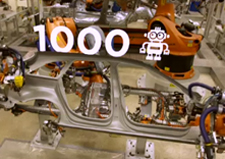Real Economy episode examines the impact of automation on work and employees in Europe

date: 12/04/2017
The latest episode of Real Economy looks at how workers may need to adapt as robots take over more of the work currently performed by human beings. Experts believe that the latest cyber-physical systems and the “Internet of things” demonstrate how we are now in the fourth phase of the Industrial Revolution, and thus need to figure out how to progress. In Germany, the government is looking to the future with a programme called Work 4.0. The new “social compromise” aims to provide more work-life balance for staff and better working conditions, while embracing technology and its advantages. At Audi’s sprawling car factory in Ingolstadt, around 600,000 new cars are made every year by 1,000 different robots, but the company says it will still need all of its 44,000 on-site staff. While this is reassuring, the stark reality is that some 9% of developed world jobs are at a high risk of becoming automated, according to the Organisation for Economic Co-operation and Development. Marianne Thyssen, European Commissioner for Employment, Social Affairs, Skills and Labour Mobility, says that workers must have good working conditions in this new digital era and that we must ensure that everybody is in a social security system. The Commission is now preparing the final launch of this pillar of social rights, according to Thyssen.
